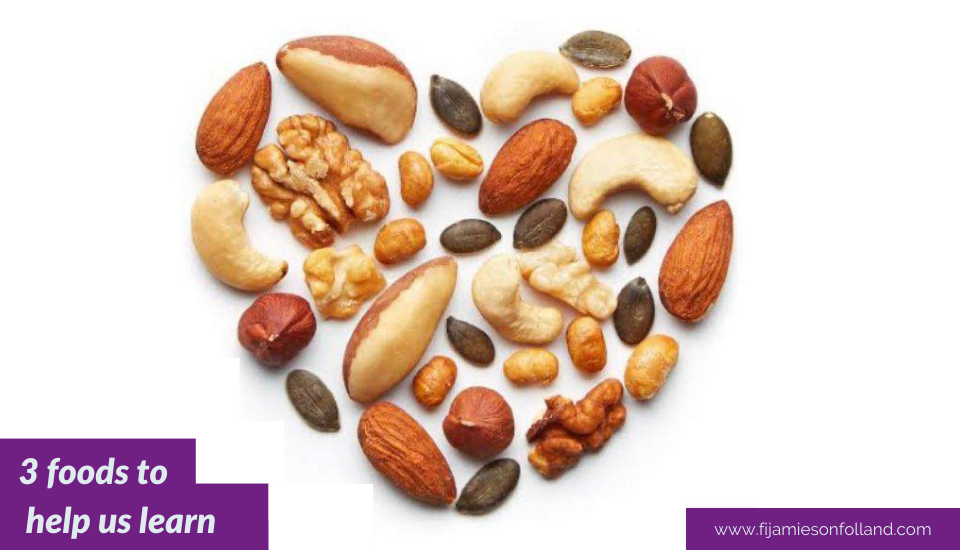Which foods do you reckon are the ideal ones to help us learn? – You may surprise yourself with what you already know! 🙂
There are many however my 3 top food-types that have been shown to help our brains focus optimally, are grouped into the following categories – 1
- HIgh quality protein
- Omega 3’s – fabulous brain fuel – amongst other functions
- Power-packed antioxidants
Protein – this helps our brain send messages to the rest of our body.
We also need proteins to help us create brain chemicals that can improve our mood. So this important food group doesn’t just help us process information and be focused and effective – eating good quality protein can actually also lift our mood.
Examples of protein-rich food include –
Vegan options incl nuts and seeds. These foods also contain carbs, although they’re complex carbs and include fiber and good fats including omegas. Remember to go for raw and organic when you can, and pre-soak and rinse them for at least a few hours first.
Another protein source includes legumes and beans, so rehydrating these and cooking them thoroughly is another option. Our instant pot is a total whizz for this!
When it comes to soy products – I’m a fan of fermenting these, in particular miso and tempeh as find they’re easier for me to digest. Non-processed soy product options are best.
The key factor when it comes to optimal foods is that we each have our own cellular fingerprint and we’re each unique in terms of what works best for us – there’s no one shoe fits all.
For those who eat meat – grass-fed options can be a valuable protein source, alongside eggs and dairy.
Omegas – These are our valuable fats and include flax seeds, and oily fish for those who eat meat, plus chicken and eggs.
Antioxidants– these have been linked with helping to reduce brain damage, which is ideal given the increasing prevalence of diseases related to brain degeneration including Alzheimers and dementia.
Each and every one of our cells are going to get damaged over time – it’s just part of life! Even breathing damages our cells, and finding a viable way to offset this is vital.
Antioxidants can be found in fruits and veggies. Importantly, what I’ve found for myself and for many clients is making sure that we’re actually taking a high quality multi that gives us the best nutrients-range as most of us (even when we eat very well) don’t always get the variety and quality of nutrients our cells need, from our food alone.
Talking of foods, kiwi fruit and unsweetened pomegranate juice are goodies to target.
Happy selecting, and I’ll see you on this week’s #AlivewithFi when we dive in deeper on this important topic.
In the meantime, ciao for now 🙂
1 The foods we consume can have a significant impact on how our brains function. This can be handy to remember, along with specific foods to focus on, around exam time when we’re often buried in study –
https://au.reachout.com/articles/foods-that-help-our-brain-study
“Foods that help our brain study”
ReachOut.com (2022)
Fi Jamieson-Folland D.O., I.N.H.C., is The LifeStyle Aligner. She’s an experienced practitioner since 1992 in Europe, Asia and New Zealand as a qualified Osteopath, Integrative Nutrition Health Coach, speaker, educator, writer, certified raw vegan gluten-free chef, and Health Brand Ambassador.


